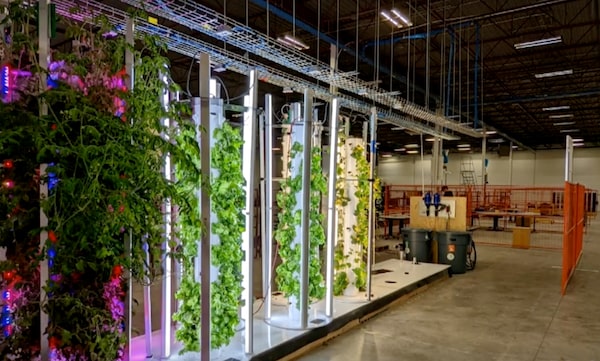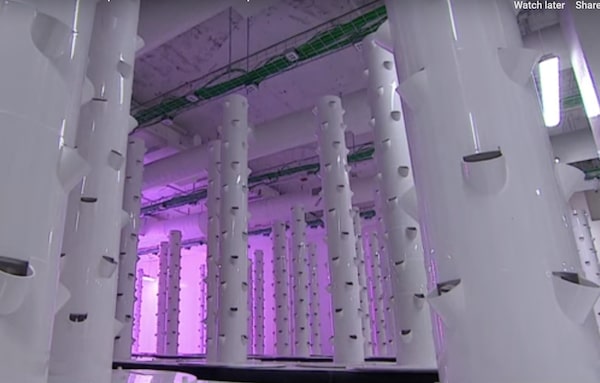
Agriplay’s futuristic farm takes over the second floor of Aspen Properties’ Calgary Tower Centre.Agriplay Ventures/Supplied
In downtown Calgary, where owners of office buildings must contend with North America’s highest vacancy rate – according to CBRE, one of every three offices is empty – a local landlord has welcomed a tenant with a growing business: indoor farming.
Aspen Properties has rented out three floors of an office building at its Calgary Tower Centre to vertical indoor farming startup Agriplay Ventures Inc.
So far, one of those floors has been outfitted with Agriplay’s custom, modular growth system, which, by mid-April, should be sprouting fruits and vegetables in quantities hundreds of times the volume of a same-size conventional farm. The company plans to fully convert all three floors to farms by the end of the year.
An innovative way to solve vacancy issues, Agriplay’s indoor farm is “exciting, interesting,” and “a welcome addition to our portfolio,” says Rob Blackwall, Aspen’s chief operating officer. “[Contributing] to better food security for the surrounding area is very complimentary to [our] ESG goals.”
“We are no different than an office user, except our furniture grows food.”
— Dan Houston, president of Agriplay Ventures Inc
Mr. Blackwell would not have handed over the fobs to just any indoor farmer: Agriplay convinced the landlord that his office space would be improved by growing large quantities of tomatoes, cucumbers, lettuce and more.
”We are no different than an office user, except our furniture grows food,” says Dan Houston, president of Calgary-based Agriplay. “But when we move out, we’ll leave a clean, base structure that has been upgraded with smart-building infrastructure. That’s a net gain for a landlord.”

The second floor of the east office building at Calgary Tower Centre, owned by Aspen Properties, will soon be sprouting cucumbers, tomatoes, lettuce and more in quantities hundreds of times the volume of a same-size outdoor farm.Aspen Properties/Supplied
Mr. Houston, who worked for 17 years in commercial real estate before launching Agriplay in 2021, says the company’s lightweight, snap-in, snap-out growing system was designed specifically for easy installation into existing office real estate.
Unlike the handful of other indoor vertical farms around Calgary, “you don’t need industrial space – the market for which is tight across the country” – to grow Agriplay’s produce, he says.
“We were in the unique position to develop technology from the ground up, focusing on what an office landlord would require, to be comfortable plugging the system into an existing unused space,” says Mr. Houston, who plans to license Agriplay’s technology to global markets, with Western Canada and Illinois licenses already acquired.
In fact, an office building provides a nearly ideal environment for growing food, says Mr. Houston. It’s already heated, air-conditioned and well ventilated.
Agriplay’s installation protocols involve sealing a base-building space for moisture control before assembling rows of Agriplay’s aeroponic-like precision rainfall growing systems. Sunlight, soil, pesticides are not required; only a small amount of water and a stable feed of nutrient solution delivered in an efficient, recyclable, closed-loop system.
At Agriplay’s futuristic research facility, located in northeast Calgary, advanced automation and artificial intelligence, driven by data from the world’s top agriculture and technology experts, program systems including lighting, climate and nutrient solution recipes to ensure maximum growth for up to 150 different crops – some offering 30 harvests a year.
“We made it really simple,” says Mr. Houston. “You don’t have to know a single thing about growing strawberries. Basically, you just tell the system, I want to grow strawberries.”
It can even print out purchasing orders for potential buying partners in 92 global markets.
In addition, Mr. Houston claims that with its “extremely efficient” 70-watt LED plant-lighting technology, Agriplay’s farms use as little as 10 per cent of the energy of traditional warehouse-based vertical farms – a number of which have scaled back operations, citing skyrocketing energy costs. (This includes Germany’s Infarm, which recently closed its Calgary centre, opened in 2021.)
”The only reason Agriplay was able to use the space in our office building,” says Mr. Blackwell, “is because they are not nearly as power-intensive as other vertical farming technologies. From what I understand, they use just a little more power than a high-density office user.”
Invest Alberta has signed a memorandum of understanding with Agriplay Ventures to connect the company with agri-investors. In the meantime, Agriplay’s subsidiary, Agriplay Farms, is negotiating offers on more than one million square feet of office space in Calgary, as well as 300,000 square feet of office space in Edmonton.
Agriplay’s cloud-connected technology costs about $800,000 for every 10,000 square per foot of vertical farm. Based on the company website’s revenue calculator, 10,000 square feet of tomatoes at a wholesale price (determined by Mr. Houston as 65 per cent of Walmart’s retail price) of $5.20 per pound, could gross annual revenue of $4.7-million; strawberries, at a wholesale price of $3.90 per pound, could reap $3.5-million.
The calculator indicates energy would cost $2,400 per month. Mr. Houston says, given three full-time employees would be required to run a 10,000-square-foot farm, the operating profit margin would be approximately 22 per cent.
Mr. Houston claims his “ultimate goal is to solve food security internationally,” by helping cities grow food in underutilized buildings.

Agriplay’s automation and artificial intelligence systems program lighting, climate and nutrient solution recipes. 'You don’t have to know a single thing about growing strawberries,' says Agriplay president Dan Houston.Agriplay Ventures/Supplied
“A lot of landlords love the idea. They’ve got very limited opportunities in terms of what they can do with a vacant building if they can’t find the people, which is kind of chronic in many places right now.”
Currently, an estimated two-thirds of produce consumed in Canada is imported; a 2021 report by Canadian Chamber of Commerce recommends the federal government “work with the indoor farming sector to enhance local food production.”
Thom Mahler, Calgary’s director of downtown strategy, says Agriplay’s office-to-farm conversions align with the city’s urban initiatives. “The obvious reason is we have so much vacant office space. Our strategy is heavily focused on removing office space from the inventory because that helps to increase the value of all remaining properties.
”And I know from talking to Agriplay, their business plan is to become a major supplier to the local food industry. So, we’re very supportive of that as well. We will streamline permit application processes to get these kinds of developments happening.”
Kristi Peters, food systems planner at the City of Calgary, says that while indoor farms can’t replace the city’s dependency on imported food, Calgary’s indoor farm sector – also including warehouse-based Deepwater Farms and NuLeaf Farms as well as a soon-to-open 74,000-square-foot GoodLeaf Farms facility, can offer more predictable year-round yields.
“Last year, the supply of produce basically dried up in our grocery stores,” recalls Ms. Peters. “Literally, there was nothing. And then, within a few days, suddenly all the indoor farm brands were filling up the shelves in Safeway, Sobeys, IGA. And they’ve stayed, which is a success story for them. It’s a win-win for our local food system.”